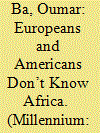|
|
|
Sort Order |
|
|
|
Items / Page
|
|
|
|
|
|
|
| Srl | Item |
| 1 |
ID:
184140


|
|
|
|
|
| Summary/Abstract |
Bombing begets pedagogy’, Naeem Inayatullah writes, reflecting on the sudden American thirst for knowledge on the Afghan people and its cultural landscape, soon after the US started its 2001 bombing campaign.2 The African predicament too, is a fertile ground for exploration, study, translation, and explanation. But above all, it is a site for life stories waiting to be tapped, taped, filled into survey questionnaires, and ran through regression tables. The aftermath of mass atrocities or deadly elections, an influx of Chinese loans, and military coups against inept satraps3 all provide ample opportunities for Europe and American scholars to flock into the continent.
|
|
|
|
|
|
|
|
|
|
|
|
|
|
|
|
| 2 |
ID:
183908


|
|
|
|
|
| Summary/Abstract |
From Bamiyan to Timbuktu and Palmyra, Islamic fundamentalist groups have willfully destroyed cultural edifices which were listed as world heritage sites. Yet, beyond the criminal acts and their shock value, this article argues that attacks on cultural and religious sites may be viewed as actions embedded in a political project of gouvernement. In this regard, spectacular destruction of cultural heritage may not be simply a signal sent to the international community, but rather an action embedded in a broader political project of governing territory and its inhabitants, aimed at building a new political community based on a new ethos that includes the control of the economy of cultural heritage sites. This article uses the destruction of cultural heritage sites in Timbuktu in 2012 to show the ways in which they fit within the political project of the Ansar Dine jihadist group. Furthermore, the Islamic State’s attacks on cultural sites in Syria and Iraq are also analyzed in light of a political project to govern the territory and communities. The broader implications of this study include the need to pay closer attention to perpetrators’ claims and justifications and to take them seriously, by both international justice scholarship and policy circles. Doing so does not absolve the crimes or mitigate their gravity, but rather allows for better approaches to identify, protect or rebuild cultural heritage in conflict settings.
|
|
|
|
|
|
|
|
|
|
|
|
|
|
|
|
| 3 |
ID:
177246


|
|
|
|
|
|
|
|